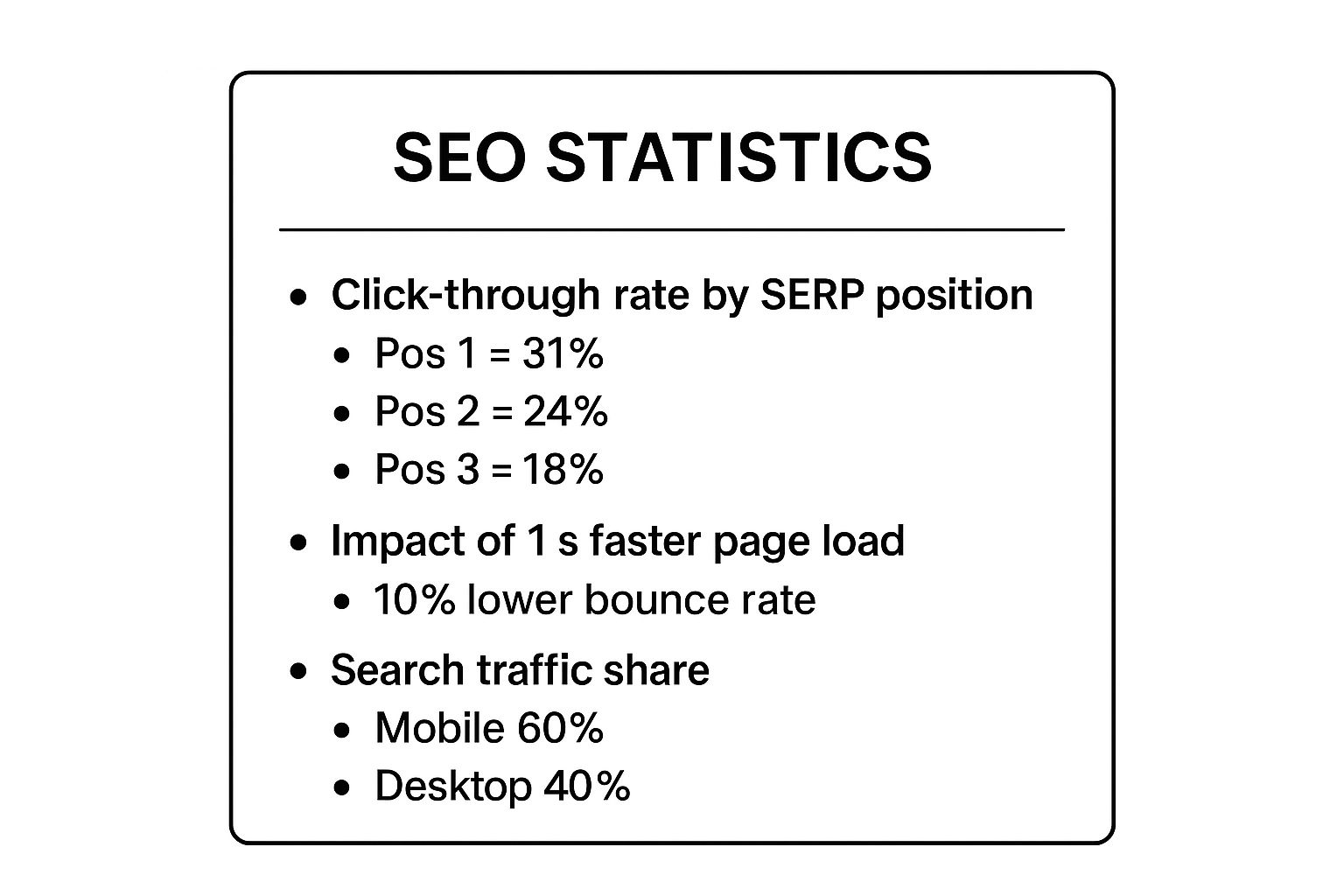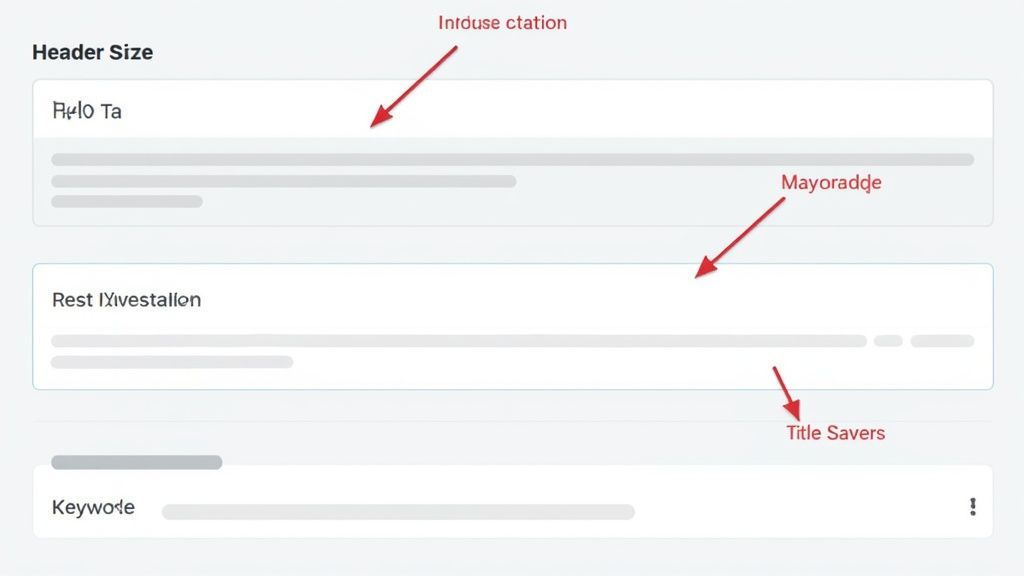Climbing the search rankings isn’t about finding a secret trick; it’s about building a sustainable growth engine. The most effective framework combines three core pillars: AI-driven content automation, a smart internal linking structure, and sharp, data-driven analytics to keep everything optimized.
A Practical Framework for Higher Search Rankings
Forget chasing every minor algorithm update. The key to improving search engine rankings is building a system where great content, intelligent site architecture, and constant feedback work together. This guide provides a practical blueprint for moving beyond temporary hacks and toward lasting authority and real organic growth.
It all starts with content. In today’s SEO landscape, search engines reward depth and genuine value, making exceptional content non-negotiable.
Actionable Insight: The data doesn’t lie. Longer, comprehensive content consistently outperforms shorter articles. This shift proves that search engines are prioritizing posts that fully solve a user’s problem, cementing the publisher as a true authority on that topic.
This is where a tool like AIWU becomes a game-changer. It solves one of the biggest bottlenecks in any SEO campaign: creating expert-level, long-form articles at scale. With AIWU, you can consistently publish the kind of in-depth content that both search engines and human readers are looking for.
This breakdown highlights the key metrics that directly impact your search rankings.

The numbers are clear. Every detail, from your ranking position to your site’s mobile experience, directly impacts your ability to attract and retain organic traffic.
The Undeniable Power of Comprehensive Content
High-quality, strategic content is a massive lever for search performance. The stats back this up—articles over 3,000 words can pull in triple the traffic compared to an average blog post.
Not only that, but these deep-dive pieces tend to rack up 4x more shares and 3.5x more backlinks. Those are the exact authority signals Google rewards.
While this framework works for any website, businesses targeting a specific geographic area can see huge wins by layering in specialized tactics. If that’s you, it’s worth learning how powerful local SEO strategies can be for dominating your local market.
This brings us to a summary of the strategies we’re discussing. Think of these as the three legs of the stool supporting your entire SEO effort.
Core Pillars for Improving Search Rankings
| Strategy Pillar | Primary SEO Goal | How It Solves Your Problem |
|---|---|---|
| AI Content Automation | Establish Topical Authority | AIWU helps you consistently publish in-depth, expert content that signals authority and relevance to search engines, answering user queries comprehensively. |
| Internal Linking | Distribute Page Authority & Improve UX | A strong linking structure helps search crawlers understand site hierarchy and spreads “link equity,” boosting the rank of your most important pages. |
| Analytics & Optimization | Refine Strategy with Real Data | Tracking key metrics provides the feedback needed to double down on what works and fix what doesn’t, ensuring continuous, data-driven improvement. |
These pillars don’t work in isolation. Internal linking and analytics amplify the power of your content. A solid internal linking strategy spreads authority across your site and shows search crawlers what’s important. Meanwhile, analytics provide the critical feedback loop needed to constantly refine your approach.
Put them all together, and you have a powerful, self-reinforcing engine for improving search engine rankings and achieving sustainable growth.
Automate High-Quality Content With AIWU

Let’s be practical: consistent, high-quality content is the engine of any effective SEO strategy. It’s also the biggest bottleneck for most teams. The time and resources required to produce genuinely helpful articles are massive. This is precisely where AIWU changes the game, allowing you to scale your content creation without the usual pain points.
The goal isn’t just to create more content, but to create better content, faster. AIWU gives you the power to generate authoritative, long-form articles optimized for your target keywords. This is fundamental to improving search engine rankings because it helps you build topical authority and consistently signals to Google that your site is fresh, relevant, and helpful.
From Keyword to Authoritative Article
It all starts with a single target keyword. Instead of staring at a blank page, AIWU helps you build a comprehensive article outline based on what’s already ranking on page one. This ensures your content covers all critical subtopics and answers the questions real users are asking, giving you a competitive edge from the start.
Real-World Use Case: Imagine your target keyword is “best indoor gardening system.” AIWU analyzes top-ranking pages to help you structure a powerhouse article. It might suggest sections on hydroponic vs. aeroponic systems, reviews of top brands, a detailed buyer’s guide, and an FAQ section. This approach guarantees your final article is far more thorough than what your competitors are publishing.
From that solid outline, AIWU can generate the full article—turning your blueprint into a polished, 3,000-word guide. The best part? You maintain full control over the tone, style, and specific details, ensuring the output perfectly matches your brand’s voice.
How AIWU Solves Real-World Content Problems
The practical uses for AI-driven content are huge. Let’s look at a couple of common scenarios where AIWU solves a major problem for a website owner.
- Problem: Building Topical Authority from Scratch. A new business selling sustainable home goods wants to be the go-to resource for eco-friendly living.
AIWU Solution: They use AIWU to create a massive pillar page, “The Ultimate Guide to a Sustainable Home.” Then, they quickly generate a cluster of supporting articles on topics like “zero-waste kitchen swaps,” “DIY natural cleaning solutions,” and “energy-efficient home improvements.” This deep web of interconnected content rapidly establishes them as an expert in the eyes of search engines. - Problem: Capturing High-Intent Traffic. An e-commerce site selling outdoor gear needs to attract users who are ready to buy.
AIWU Solution: They use AIWU to create detailed product comparison articles like “Brand X vs. Brand Y Backpacks” or “Top 5 Tents for Cold Weather Camping.” These articles target users with high commercial intent, answering their final questions and driving them directly toward a purchase.
Actionable Insight: The real value of content automation is how it fuels a broader SEO strategy. It’s not about replacing human writers. It’s about empowering your team to produce strategic, high-impact content at a scale that was previously impossible.
If you’re running a WordPress site, these content strategies are essential. For a deeper dive, check out our guide on mastering SEO on WordPress.
Fine-Tuning AIWU for Optimal Output
Getting great results from AIWU is about more than just entering a keyword. Taking a moment to adjust the settings and provide clear instructions is what separates generic AI content from articles that actually rank.
Here are a few actionable steps for configuring your content generation:
- Set the Tone of Voice: Tell the AI if you want the tone to be “professional,” “casual,” “witty,” or “informative.” This keeps your brand voice consistent.
- Define Your Target Audience: Are you writing for “beginner hikers,” “experienced software developers,” or “small business owners”? Defining this helps AIWU use the right language and examples.
- Include Negative Keywords: Instruct AIWU to avoid certain topics or phrases that are off-brand or irrelevant. This keeps the content hyper-focused.
By taking a few extra seconds to configure these settings, you guide the AI to produce a much sharper, more effective piece of content. This level of control makes automation a serious tool for improving search rankings. For a broader look, explore these expert tips and strategies to automate content creation.
Ultimately, automating your content with AIWU frees you up to focus on high-level strategy that drives measurable growth.
Build a Powerful Internal Linking Web

Internal links are the unsung heroes of SEO. They’re one of the most powerful—and often overlooked—tools in your arsenal. Think of your website like a city. Without a smart road system connecting everything, search engines get lost, and valuable authority gets trapped on dead-end pages.
A strong internal linking strategy does more than connect pages; it builds a strategic web of authority. It shows search engine crawlers which pages are most important and funnels “link equity” (or PageRank) from your strong pages to others you want to boost.
This is where a tool like AIWU becomes your secret weapon. As you generate new articles, its Smart Crosslinking feature automatically identifies contextual linking opportunities, helping you weave this powerful web without missing a beat. This solves the problem of keeping your site structure strong, even as you rapidly scale content.
The Topic Cluster Model Explained
One of the most effective ways to organize internal links is the topic cluster model. It’s a structure that signals deep expertise to search engines on any given subject.
Here’s the simple breakdown:
- Pillar Page: A long-form, authoritative guide on a broad topic (e.g., “Digital Photography Basics”).
- Cluster Content: More specific articles on related subtopics (e.g., “understanding aperture,” “choosing a camera lens,” “photo editing for beginners”).
- The Links: Each cluster article links up to the main pillar page, creating a powerful, interconnected hub.
This setup creates an authority loop. As your cluster articles rank and attract traffic, they pass authority up to your pillar page, turning it into a powerhouse for your most competitive keywords.
Real-World Use Case: Boosting a Sales Page
Let’s make this practical. Imagine you run an e-commerce site selling home fitness gear. Your “Treadmills for Sale” category page is your money page, but it’s hard to rank because it’s naturally thin on content.
The Problem: How do you get a commercial page to rank higher?
The Solution: Use informational blog content to boost it. With AIWU, you can generate a series of helpful blog posts that answer questions your potential customers are asking.
Your Content Plan:
| Article Topic | Keyword Target | Link Direction |
|---|---|---|
| The Ultimate Guide to Treadmill Maintenance | informational | Links to the “Treadmills for Sale” page |
| 5 Best HIIT Workouts for Treadmills | informational | Links to the “Treadmills for Sale” page |
| Treadmill vs. Elliptical: Which Is Better? | informational | Links to the “Treadmills for Sale” page |
| How to Choose the Right Treadmill for You | informational | Links to the “Treadmills for Sale” page |
Each of these blog posts attracts its own organic traffic. The key is what you do inside the content. Somewhere in the “Treadmill Maintenance” guide, you add a natural, contextual link: “And if your current machine is beyond repair, check out our latest selection of high-performance treadmills.”
The Result: The authority from these four informational posts flows directly to your sales page. Google sees these contextual links and understands that your “Treadmills for Sale” page is an authoritative hub, dramatically improving its chances of ranking.
Best Practices for Internal Linking
Randomly adding links won’t work. To make this effective, follow these best practices:
- Use Descriptive Anchor Text: Avoid “click here.” Use anchor text that describes the destination page, like “our guide to HIIT workouts,” to give users and search engines context.
- Link Deep Within Your Site: Don’t just link to your homepage. Send authority to your important product pages, service pages, and cornerstone articles where it can make a real difference.
- Ensure Links are Contextual: The links must make sense within the content. A link from an article about dog training to one about cat food is confusing. Keep links highly relevant.
- Don’t Overdo It: Stuffing a page with too many links looks spammy and dilutes their value. Add links where they genuinely add value for the reader. Quality over quantity.
By systematically applying these techniques—especially with the automation power of AIWU—you can turn internal linking from an afterthought into a primary driver of your SEO success.
Use Analytics for Continuous SEO Improvement
Hitting “publish” is just the starting line. Sustainable wins in search rankings come from a relentless cycle of data-driven refinement. Analytics turn your SEO guesswork into a precise science, showing you exactly what’s working, what isn’t, and where your next big opportunity lies.
This isn’t about getting lost in spreadsheets. It’s about creating a tight feedback loop where data directly fuels your next strategic move. When you focus on the right numbers, the content you create with AIWU becomes an asset that improves over time.
Identifying KPIs That Truly Matter
First, cut through the noise. It’s easy to drown in data. Zero in on the metrics that give you a clear picture of your SEO health.
Here are the key performance indicators (KPIs) to watch:
- Organic Traffic Growth: Is the number of visitors from search engines trending up? This is your North Star metric confirming your strategy is working.
- Keyword Rankings: Are your target keywords climbing from page two to page one? Are you holding top-three spots? This tells you if your content is hitting the mark.
- Click-Through Rate (CTR): Found in Google Search Console, this shows the percentage of people who see your page in search results and actually click. A low CTR, even with a high ranking, signals your title or meta description needs improvement.
- Conversions from Organic Traffic: Does your organic traffic lead to action (form fills, sign-ups, sales)? This is the bottom-line metric that measures business impact.
Tracking these KPIs provides an honest health check on whether the content AIWU helps you create is driving real results.
Turning Data Into Actionable Insights
Once you’re tracking the right metrics, the real work begins: interpreting the data to make smarter decisions.
Actionable Tactic: Hunt for “striking distance” keywords. These are terms where you already rank on page two of Google (positions 11-20). With a small push, these pages can jump to page one and see a massive traffic boost.
Real-World Use Case: Your Google Search Console data shows an article on “how to choose a camera lens” is stuck at position 15 but has many impressions. This is a golden opportunity.
The Solution: Use AIWU’s content editor to refresh the article. Add more depth, embed a relevant video, or build a few more internal links to it. Often, these small tweaks are all it takes to push it to page one. To master this, you need to understand the power of Google Analytics and how to spot these trends.
Creating a Content Refresh Cadence
Content isn’t static; it decays over time. A proactive refresh strategy is non-negotiable, and your analytics will tell you exactly which content to prioritize.
Here’s a simple, actionable workflow:
- Pinpoint Underperforming Content: Look for pages with a significant drop in organic traffic or rankings over the last 3-6 months. These are your top refresh candidates.
- Analyze and Upgrade: Re-evaluate the article. Is the information still accurate? Use AIWU to expand thin sections, add new data, and ensure it’s more comprehensive than the current top-ranking content.
- Strengthen Internal Links: While updating the post, find new opportunities to link to it from other relevant articles on your site. This sends fresh authority signals to the page you just improved.
This continuous optimization loop ensures your content library actively works as a high-performing asset. For more guidance, check out our deep dive on how to increase organic traffic with these data-backed methods.
Integrate Advanced Technical SEO Tactics
With your content and internal linking engines running, it’s time to add the advanced technical signals that provide a true competitive edge. This is what separates good SEO from great SEO. It’s about amplifying your hard work by speaking directly to search engines in their native language.
You’re moving beyond just writing great articles and starting to architect how they appear and are understood by Google. This involves a bit of code and a lot of strategy to build your site’s reputation and signal deep authority.

This is how you start to see serious movement in the SERPs for your most important pages.
Supercharge Your Content With Schema Markup
Schema markup is like a secret language you use to communicate with search engines. It’s structured data added to your website’s code that helps Google understand your content on a much deeper level.
Instead of just seeing a block of text, Google can definitively understand that a specific number is a product price, a string of words is a recipe step, or a list of questions is an FAQ.
This is incredibly powerful for the content you’re generating with AIWU. After creating a comprehensive guide, you can use schema to define its key elements explicitly.
- For “How-To” Articles: Use
HowToschema to outline each step, making your content eligible for rich snippets that walk users through a process directly in the search results. - For FAQ Pages: Implement
FAQPageschema. This can make your questions and answers appear in a dropdown format under your search listing, taking up more SERP real estate. - For Product Reviews: Use
Productschema to mark up ratings, prices, and availability, creating eye-catching review snippets that improve click-through rates.
Actionable Insight: By adding schema markup, you’re not just hoping search engines figure out what your content is about—you’re telling them directly. This dramatically increases your chances of earning rich snippets, which can seriously improve your organic visibility and CTR.
Implementing schema might sound complex, but many WordPress plugins simplify the process, letting you add it to your AIWU posts without being a coding expert.
Cement Authority With Topic Clusters and Backlinks
While internal linking builds your site’s internal authority, earning high-quality backlinks builds its external authority. Backlinks are votes of confidence from other websites and remain a powerful ranking factor.
Your automated content engine is the perfect foundation for attracting these links. By consistently publishing in-depth, data-driven pillar articles with AIWU, you create assets that other sites will want to reference and link to.
This is why combining schema and backlinks is so effective. High-quality backlinks boost your site’s credibility, while schema helps search engines understand the content earning that credibility. With 53.3% of all website traffic coming from organic search, optimizing these technical factors is critical for growth.
Of course, none of this matters if your site’s core technical health isn’t solid. User experience is a massive ranking factor, so don’t forget the basics. For more on this, check out our guide on how mobile responsiveness problems impact your SEO rankings.
Practical Strategies for Earning Backlinks
Waiting for backlinks to appear is a slow game. To accelerate results, you need to be proactive.
Here are a few proven tactics:
- Broken Link Building: Use a tool to find broken links on authoritative websites in your niche. If you have a relevant AIWU-generated article that could replace that dead link, reach out to the site owner and offer your content as a helpful fix.
- Guest Posting: Write an article for another reputable website in your industry. In your author bio or within the content (if allowed), include a link back to one of your most important pillar pages.
- Digital PR: If your AIWU content includes original data, a unique perspective, or a valuable free tool, promote it. Actively reach out to journalists and bloggers, letting them know you’ve created a resource their audience would love.
By integrating these advanced tactics—schema for clarity and backlinks for authority—you complete the trifecta. Your site will have great content, a strong internal structure, and powerful external signals, creating an unstoppable force for improving search engine rankings.
Diving into AI-driven content brings up valid questions. It’s a new frontier in SEO, and it’s smart to understand how it works, what to expect, and how to ensure you’re getting real results.
Let’s tackle some of the most common questions about using a tool like AIWU to improve search engine rankings.
The biggest concern is whether search engines penalize AI-generated content. The short answer is no. Google has been clear: their systems reward high-quality, helpful content, regardless of how it was created. It doesn’t matter if it’s written by a human, an AI, or a human-AI collaboration.
The key is that the final article must serve the user. AIWU is a powerful tool for creating content at scale, but the ultimate responsibility for quality and accuracy rests with you. That’s why the platform gives you full control—letting you edit, fact-check, and inject your unique expertise into every piece before it goes live.
How Do I Maintain Quality Control with AI?
This is the most critical question. The answer is to treat AI as a powerful assistant, not a replacement for your expertise. Your insights are what make the content unique and valuable.
A practical workflow involves using AIWU to handle the heavy lifting—like generating a detailed outline or drafting the initial article. Then, you step in as the expert editor.
Here’s a simple quality control checklist:
- Fact-Check Everything: Always verify statistics, dates, and specific claims. AI is powerful but not infallible and can “hallucinate” facts.
- Add Your Stories: Weave in real-world examples, case studies, or personal anecdotes. This adds a human touch that AI cannot replicate.
- Refine the Tone: Read it aloud. Does it sound like your brand? Tweak the language until it feels authentic.
- Check for E-E-A-T: Does the content demonstrate Experience, Expertise, Authoritativeness, and Trustworthiness? This is a crucial factor in how Google assesses content quality.
Following this process allows you to use AIWU to get a solid first draft in minutes, freeing you to focus on the high-value editorial work that makes your content stand out.
What Kind of ROI Can I Realistically Expect?
Measuring the return on AI content isn’t just about counting published articles. It’s about tracking metrics that matter to your business.
Your ROI will appear in a few key areas:
- Time and Cost Savings: Calculate the hours you or your team would have spent writing that same content from scratch. AIWU slashes this time, reallocating budget and energy to other high-impact tasks like link building or promotion.
- Increased Organic Traffic: As your new content ranks, you should see a clear uptick in organic sessions in your Google Analytics. Filter traffic to the specific pages created with AIWU to measure their direct impact.
- Lead and Revenue Growth: This is the ultimate measure. Are these new visitors signing up, filling out forms, or buying? Tie organic traffic growth directly to these bottom-line business goals.
Real-World Example: You use AIWU to publish 20 in-depth articles. Those articles start bringing in an extra 5,000 organic visitors per month, and that traffic generates 50 new, qualified leads. Now you have a clear, measurable return.
The real ROI isn’t just in the content itself. It’s in the speed and consistency that automation provides, allowing you to build topical authority and momentum much faster than your competitors.
Ready to transform your content strategy and start climbing the search rankings? Discover how AIWU can automate your SEO workflow, build topical authority, and drive real growth for your WordPress site. Get started with AIWU today!

